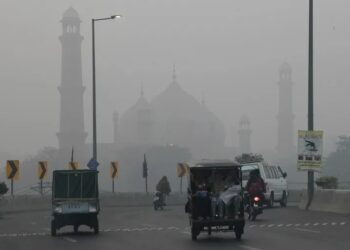Written by: Abdul Basit Alvi
The concept of the “state” is fundamental to the study of political science, sociology, and international relations, forming the bedrock of modern governance. It profoundly influences the lives of individuals and societies around the world. At its core, the state is an organized political community that claims the exclusive right to use force within a defined territory. This definition, proposed by the German sociologist Max Weber, captures the key characteristics of the state: structured authority, territorial boundaries, and the ability to enforce laws and maintain order. The state is distinct from other forms of authority—such as tribes, clans, or religious institutions—because of its centralized power and control.
States function under the rule of law and are governed through various systems, such as democracy, monarchy or dictatorship. The state holds supreme authority within its territorial limits, making it independent from any external power. Clearly defined geographical boundaries are essential for the existence of a state. The state is organized and led by a government, which may be composed of elected officials, appointed leaders, or a combination of both. A state is considered legitimate when its authority is recognized by both its citizens and other states.
The state’s exclusive right to use force allows it to maintain order, enforce laws, and protect its citizens. It serves several essential functions to ensure the stability, security, and well-being of its population. One of the primary functions of the state is to establish and enforce laws that uphold public order and safeguard individual rights. This includes law enforcement, the judicial system, and the penal system to address crime and disputes. The state is also responsible for defending its citizens from external threats, such as military invasions or cyberattacks. The security apparatus of a state includes national defense, intelligence agencies, and law enforcement.
The state plays a crucial role in regulating the economy, enacting and enforcing laws related to commerce, taxation, monetary policy, and labor rights. It also provides essential social services, such as healthcare, welfare, and education. In modern states, governments are responsible for ensuring a certain standard of living by offering welfare programs, healthcare, education, housing, and unemployment benefits to address inequality and improve quality of life. Additionally, the state is tasked with providing public goods that benefit society, such as infrastructure (roads, bridges, public transportation), environmental protections, and utilities like water and electricity.
In democratic states, a vital function of the state is to allow citizens to participate in governance through mechanisms such as elections, political parties, and civil society organizations. The state must also safeguard individual rights, including freedom of speech, assembly, and political participation.
The rule of law is one of the foundational principles that underpins modern democracies and is crucial for the effective functioning of any state. It ensures that all individuals and institutions, including the government, are subject to and accountable under the law. Unlike arbitrary rule, where decisions are based on personal whims or unchecked power, the rule of law guarantees that legal principles are applied consistently, impartially, and transparently.
At its heart, the rule of law asserts that no one is above the law. Laws should govern a nation, not the arbitrary decisions of rulers or officials. The rule of law requires that laws be clear, publicly known, consistently applied, and designed to protect the rights of citizens. Under the rule of law, the law is the highest authority, and no one—regardless of status, wealth, or power—is exempt from it. Every individual is treated equally under the law. Both the government and its officials are held accountable to both the law and the people they serve. Laws must be enforced without bias, and judicial decisions should be based on facts and legal principles, rather than personal prejudices or favoritism. A robust rule of law safeguards the rights and freedoms of citizens, ensuring that they are protected from violations by the state or any other authority. One of the key advantages of the rule of law is its ability to maintain justice and fairness within society. When laws are applied consistently and impartially, arbitrary decision-making is prevented. The state, through its courts, law enforcement, and other institutions, must operate in accordance with the law, not personal preferences or biases. The rule of law ensures that everyone, regardless of their status or position, has access to justice. This is essential for protecting individuals’ rights and holding wrongdoers accountable. It helps prevent discrimination and unfair treatment, creating an environment where everyone is treated equally under the law. The rule of law acts as a safeguard against the arbitrary use of power by the state. In a society where the rule of law is upheld, individuals can rely on legal protections for fundamental rights, such as the right to a fair trial, freedom of expression, and protection from unlawful detention or torture. Without the rule of law, these rights could be easily violated by government authorities or powerful individuals, leading to an unjust and oppressive society.
Protecting individual rights is a cornerstone of democratic governance. A legal system operating under the rule of law allows citizens to challenge unlawful government actions, protect their freedoms, and engage in the political process. It holds everyone accountable, including those in positions of power, preventing corruption and abuse by ensuring that government officials, politicians, and law enforcement officers are not above the law. When the law is the highest authority, it sets clear boundaries for acceptable behavior, and those who break the law must face consequences. This accountability promotes transparency in governance, as public officials are required to justify their actions and decisions. The rule of law ensures that government operations are open to scrutiny and that public resources are managed fairly and responsibly.
The rule of law is also essential for maintaining social stability and order. Laws provide a framework for resolving disputes, regulating behavior, and maintaining peace. When people know that clear, enforceable laws are in place and will be applied fairly, they are more likely to comply, reducing conflict and encouraging cooperation. Moreover, the rule of law enables peaceful dispute resolution through judicial processes rather than violence or retaliation. In societies where the rule of law prevails, citizens tend to have more trust in the legal system to address their grievances, contributing to a more stable and cohesive society.
A state governed by the rule of law is more likely to experience economic growth and development. Clear and enforceable laws create a predictable environment for business and investment. When property rights are protected, contracts are enforceable, and businesses can operate without fear of arbitrary government interference, economic activity thrives. Additionally, the rule of law helps reduce corruption and increase public trust in government institutions. With secure property rights and fair legal processes, businesses are more likely to prosper, leading to job creation and overall economic growth.
In democratic systems, the rule of law plays a critical role in ensuring political stability. It ensures that elections are fair, citizens’ rights are upheld, and legal mechanisms exist to address grievances without resorting to violence or rebellion. The rule of law fosters political trust by ensuring that the legal system operates transparently and impartially. This encourages citizens to engage in the democratic process, trust political institutions, and accept the outcomes of elections and government decisions. This strengthens the legitimacy of the state and upholds democracy.
Without the rule of law, governments may act arbitrarily, suppress dissent, and violate citizens’ rights. The rule of law provides a check on government power, ensuring that no one, including the state, can act without legal justification. By establishing constitutional limits and mechanisms for holding the state accountable, the rule of law helps prevent the rise of tyranny and authoritarianism. It ensures that government power is exercised in accordance with the law and is open to scrutiny and review by independent courts, the media, and civil society. The significance of the rule of law goes beyond national borders. On the global stage, it fosters peace and cooperation among states. International treaties, conventions, and agreements are built on the principle of the rule of law, with nations expected to uphold the commitments they make under international law. When states uphold the rule of law, they play a crucial role in fostering global stability and security. On the other hand, violations of international law, such as war crimes, human rights violations, or the disregard for international treaties, can lead to conflict, instability, and growing mistrust among nations.
The authority of the state is a cornerstone of any well-functioning society. It ensures the enforcement of laws, maintains public order, provides essential services, and protects citizens’ rights. When a state loses or fails to assert its authority, the effects are often deep and far-reaching. A weakened state authority leads to chaos, instability, and widespread suffering, creating an environment ripe for corruption, violence, and economic deterioration. By examining real-world examples, we can better understand the critical importance of state authority in upholding peace, prosperity, and justice.
Somalia serves as a notable example of a nation with weak state authority. Since the collapse of its central government in 1991, Somalia has struggled with warlordism, clan militias, and a lack of effective governance. Although the Somali Federal Government (SFG) has made some progress in recent years, the country remains highly fragmented. The absence of strong state authority has enabled groups like the militant Islamist group al-Shabaab to gain significant power. Al-Shabaab frequently conducts violent attacks, including bombings and kidnappings, targeting civilians, military personnel, and aid workers. Somalia’s weak government has been unable to meet the country’s urgent humanitarian needs. Millions face food insecurity, lack access to clean water, and endure inadequate healthcare, leading to a prolonged crisis of displacement and suffering. Without a functioning government, Somalia’s economy remains informal and heavily reliant on remittances from the Somali diaspora. Poverty and unemployment persist, further destabilizing the country. In Somalia, the lack of effective governance and strong state authority perpetuates a cycle of violence, lawlessness, and poverty, hindering any meaningful path toward peace and prosperity.
Yemen, one of the poorest nations in the Arab world, has also experienced the devastating effects of fractured state authority. Since 2014, Yemen has been embroiled in a civil war, with various factions—such as the Houthi rebels, the internationally recognized Yemeni government, and separatist groups—competing for control. The country’s state authority is severely divided, and large portions of Yemen remain outside the central government’s reach. The war has triggered one of the worst humanitarian crises in modern history. Thousands have died, and millions lack access to essential needs such as food, clean water, and medical care. The collapse of state institutions has exacerbated the population’s suffering. Yemen’s economy has disintegrated due to the ongoing conflict, and the absence of a central authority has left little room for economic recovery in the short term. The lack of state control has also hindered the rebuilding of infrastructure and restoration of basic services, further driving the country’s decline. Yemen’s civil war has also destabilized the broader region, drawing in external powers like Saudi Arabia and Iran, who back opposing factions. This has turned the conflict into a proxy war with far-reaching global implications. This has prolonged the conflict and caused ripple effects throughout the Middle East, further contributing to regional instability. Yemen’s situation highlights the severe consequences of fragmented state authority, which not only leads to a humanitarian crisis but also destabilizes entire regions. Similarly, Venezuela, once one of the wealthiest nations in Latin America, has been enduring a prolonged crisis due to the erosion of state authority under President Nicolás Maduro’s leadership. While the country has faced authoritarian rule for decades, the collapse of state institutions and the breakdown of public services under Maduro have created a perilous environment. Venezuela’s economy has been severely impacted by a combination of mismanagement, corruption, and sanctions. Inflation has skyrocketed to hyperinflationary levels, rendering the national currency almost worthless. The collapse of state institutions managing the nation’s vast oil wealth has resulted in widespread poverty, unemployment, and food insecurity. Due to the lack of essential services, millions of Venezuelans have fled the country in search of better opportunities, creating one of the largest migration crises in Latin American history. This has placed immense pressure on neighboring countries like Colombia and Brazil, which have been forced to accommodate large numbers of refugees. The erosion of the rule of law in Venezuela has sparked deep political polarization, widespread protests, and violent government crackdowns. The government’s failure to uphold democratic processes, including the imprisonment of political opponents and media censorship, has fostered a climate of fear and instability. The Venezuelan crisis highlights how the breakdown of state authority, fueled by corruption and mismanagement, can result in widespread economic and political collapse.
Protests have long been an essential aspect of democratic societies, providing a platform for citizens to voice discontent with government policies, social inequalities, or injustices. From the Civil Rights Movement in the U.S. to anti-colonial movements globally, protests have driven significant social and political transformations. However, when protests turn violent or when violence becomes a norm for demanding change, the consequences can be profound and detrimental to both society and the cause itself. Violent protests are not a productive way to demand change. While it’s important for citizens to express grievances and seek justice, violence only escalates tensions and creates more problems than it resolves.
One immediate consequence of violent protests is the way they undermine the legitimacy of the cause being promoted. As protests spiral into chaos, public attention often shifts from the original issue to the violence and destruction. This shift in focus weakens the moral and ethical standing of the protesters. For example, if a protest is aimed at addressing police brutality or advocating for civil rights, the violence distracts from these crucial issues and shifts the narrative toward the actions of a few individuals engaging in destructive behavior. As a result, public support for the cause can quickly diminish, with people associating the protest more with disorder than the demand for justice. The message becomes blurred, and those who might have supported the cause peacefully may distance themselves due to the violence.
Violent protests often create deep divisions within society. What could have been a moment of unity around a shared cause may quickly evolve into a polarized issue. Some people may support the cause but reject the violent methods used, while others might oppose the cause altogether due to the disruption and fear violence causes. This division can fuel broader societal instability. When protests are associated with violence, those who may have been sympathetic become alienated, fearing for their safety or daily lives. The violence can push people to view the protesters as adversaries, strengthening opposition and making productive dialogue even more challenging.
Violence breeds further violence. Once protests become violent, the likelihood of escalation increases, especially if the government or law enforcement responds with force. Authorities may resort to excessive measures to control the crowds, triggering a cycle of retaliation and aggression. This escalation can lead to peaceful protesters becoming caught in the turmoil, and innocent bystanders may fall victim to the violence. The result is often a vicious cycle where the original demands for justice or change are overshadowed by the destruction, injury, or loss of life caused by the protests. Instead of addressing the core issues, such protests may provoke stronger government opposition, leading to stricter policies, crackdowns, or even authoritarian measures that suppress the very causes the protesters aimed to highlight.
Violent protests also have significant economic consequences. Businesses, local economies, and public services often bear the brunt of violent demonstrations. Damage to infrastructure, businesses, and transportation networks disrupts daily life and leads to substantial financial losses. Widespread destruction can result in the closure of shops, factories, and other businesses, causing financial strain for workers and entrepreneurs. Areas affected by protests may see a decline in tourism, trade, and investment, further harming the economic well-being of the community or nation. In nations with struggling economies, the costs of violent protests only intensify the challenges, making it more difficult for governments to tackle the root causes that led to the protests in the first place. A culture of violent protests can also undermine public trust in essential institutions such as law enforcement, the judicial system, and the government itself. When violence becomes a common reaction to grievances, it fosters an environment where law enforcement and government officials are viewed as opponents, rather than collaborators in finding solutions. At the same time, governments may respond to protests with heavy-handed tactics, further alienating citizens and deepening distrust in institutions. This growing mistrust can hinder the effectiveness of institutions in governing and addressing public needs. Citizens may begin to feel disconnected from the political process, which can lead to political apathy, disillusionment, and a loss of faith in democratic systems that are meant to represent them. A culture of protests and violence offers only short-term, reactive solutions, driven by frustration and anger. However, without clear, nonviolent strategies for change, it often creates more issues than it resolves. Achieving lasting social and political change requires dialogue, compromise, and constructive engagement. Peaceful protests, negotiations, and advocacy remain the most effective ways to address grievances. History provides numerous examples of successful nonviolent movements led by figures Martin Luther King Jr., and Nelson Mandela, who brought about lasting change through dialogue and peaceful resistance. These leaders understood that real change requires patience, empathy, and engagement with opposing viewpoints rather than resorting to violence. Governments also play a key role in addressing grievances through legitimate and peaceful means. By promoting dialogue, transparency, and responsiveness, governments can build trust with their citizens and reduce the risk of protests turning violent. The state must listen to citizens’ concerns and work towards fair solutions that benefit all sectors of society. Civil society and the media also have vital roles in combating the culture of violence in protests. Civil society organizations can offer platforms for peaceful dialogue and lead public education campaigns that promote nonviolent protest methods. The media can help by focusing on the root causes of protests rather than sensationalizing violence, supporting efforts to find peaceful solutions. When citizens see that their concerns are heard and that efforts are being made for peaceful resolutions, they are more likely to engage in constructive actions. Peaceful movements have the potential to build long-term support and create positive changes that benefit individuals and society as a whole. Instead of resorting to violence, we must embrace peaceful, nonviolent protest methods and work towards building constructive dialogue between governments and citizens. True change is more likely when we engage in conversations, listen to each other, and seek solutions that promote justice and equality for all. Through peaceful methods, societies can build trust, foster cooperation, and create a future where everyone’s voice is heard and respected.
In the context of Pakistan, the culture of demanding change through mobs and repeated protests is detrimental to the country. The mindset of “might is right” and pressuring the government and institutions through mob action is neither constructive nor commendable. While the government has its responsibilities, people, political parties, and leaders also have duties and must show maturity. The examples of Yemen, Somalia, Haiti, and the recent case of Syria clearly illustrate the consequences of anarchy and chaos. The general public is suffering due to these ongoing protests, and the country is facing economic hardship. The state must enforce its authority, and citizens need to recognize the forces that are creating chaos, anarchy, and division for personal gain, rather than for the common good.

























